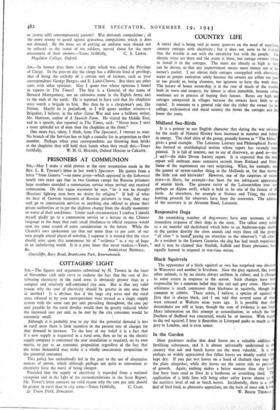COUNTRY LIFE
A GREAT deal is being said in many quarters on the need of supplyin4 country cottages with electricity ; but it does not seem to be realised that the trouble is not with the electricity but with the people. The electric wires are there and the water is there, but cottage owners refuse to install it in the cottages. The rents are already as high as they can be driven, so that any improvement means more money out of the owner's pocket. I see almbst daily cottages unsupplied with electricity, water or proper sanitation solely because the owners are either too poor or too greedy or, being absentee, too ignorant to have the work done. The nature of house ownership is at the root of much of the trouble both in town and country, for labour is often immobile, because urban workmen are in process of buying their houses. Rents are high and cottages tmrepaired in villages because the owners have little or no capital. It amounts to a general rule that the richer the owner (as on college, ecclesiastical and ducal estates) the better the cottages and the lower the rents.
Midland Sea-Birds It is a pointer to our English character that during the war societies for the study of Natural History have increased in number and indeed in energy. The chief shire of the group, proudly known as "The Shires," gives a good example. The Leicester Literary and Philosophical Society has formed an ornithological section whose report has recently been printed. It is full of interest, not to say of discovery, as good as—may I say?—the older Devon Society report. It is expected that the next report will embrace more extensive records from Rutland and Notts Some of the experiences are very surprising. What, for example, was the gannet or oyster-catcher doing in the Midlands or, for that matter, the little auk and kittiwake? However, one of the surprises of recent years—in Herts, for example—has been the not infrequent appearance of seaside birds. The greatest rarity of the Leicestershire year was perhaps an Alpine swift, which is held to be one of the fastest of all birds. As elsewhere, for example at Staines and Tring, the richest hunting grounds for observers have been the reservoirs. The address of the secretary is 20 Alvaston Road, Leicester.
Responsive Dogs An astonishing number of dog-owners have sent accounts of the immediate response of their dogs to the siren. The tallest story refers to a six months' old dachshund which bolts to an Anderson-type shelter in the garden directly the siren sounds and stays there till the proper "all clear" is heard,' paying no attention to the observer's "all clear." As a resident in the Eastern Counties the dog has had much experience and it may be claimed that Norfolk, Suffolk and Essex pheasants hat equally learned to respond to war-time noises.
Black Squirrels The appearance of a black squirrel or two has surprised one observer in Worcester and another in Evesham. Now the grey squirrel, like many other animals, is by no means always uniform in colour, and it changes to some extent in response to the season. Such changes have been responsible for a common belief that the red and grey cross. However whiteness is much commoner than blackness in squirrels, though le common in rabbits. There exists, I believe, a species of squirrel Java that . is always black, and I ant told that several score of the were released at Woburn some years ago. It is possible that the descendants are still at large, though the sum of evidence is not large More information on this attempt at naturalisation, in which the lat Duchess of Bedford was concerned, would be of interest. With regal to the red squirrel, I hear it flourishes in Liverpool parks as much as lh grey in London, and is even tamer.
In the Garden Most gardeners realise that dead leaves are a valuable addition fertilising substances, and it is almost universally understood in country that oak and beech leaves are the most valuable. It is II perhaps so widely appreciated that fallen leaves are doubly useful wh kept dry. If you put wet leaves on a head of rhubarb they may k the plant altogether, while dry leaves are the surest aids to precoa of growth. Again, nothing makes a better manure than dry leat that have been used as litter in a henhouse or scratching shed. application of a little lime will bring other softer leaves almost up the nutritive level of oak or beech leaves. Incidentally, there is a g deal of bird food, as pheasants appreciate, on the back of most oak leA%
W. BEACH THOMAS.


























 Previous page
Previous page